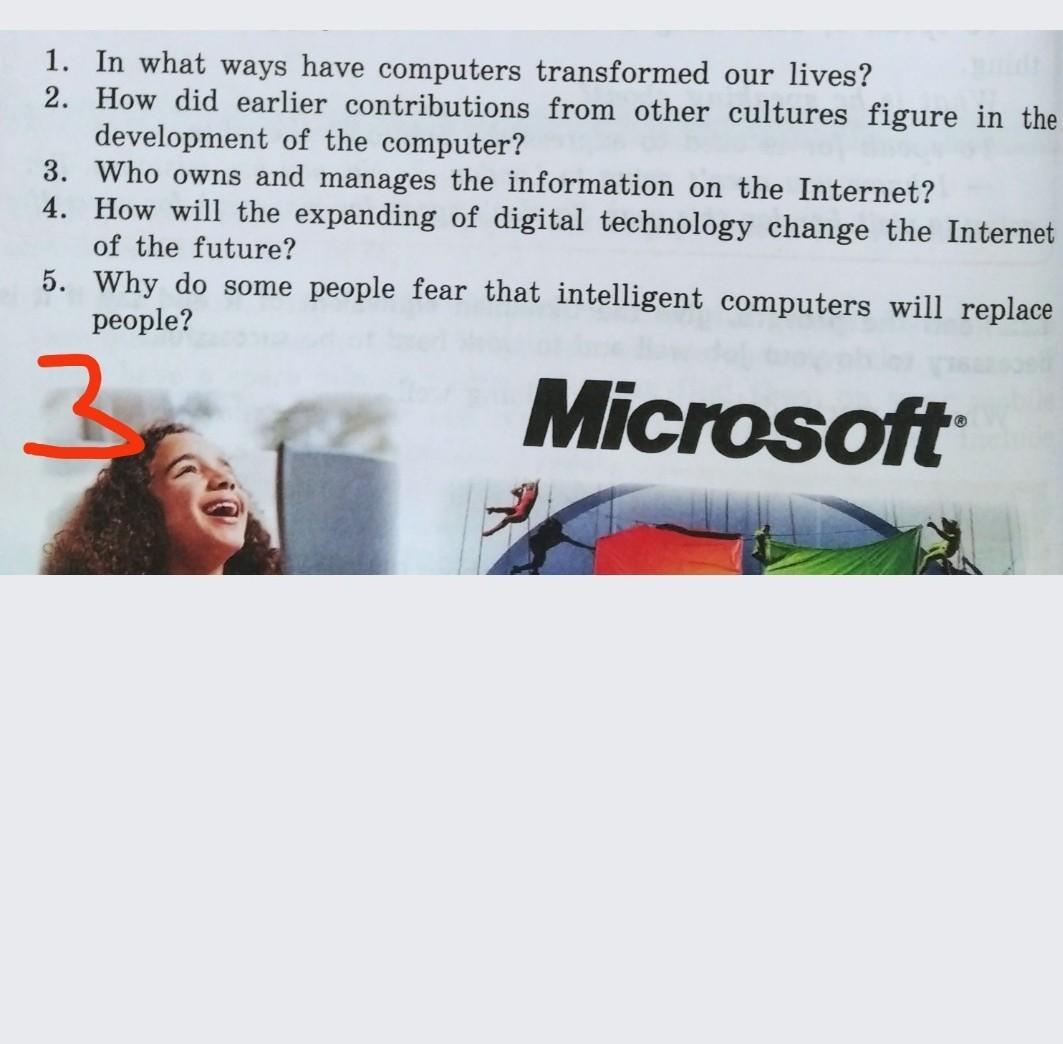1. In what ways have computers transformed our lives? 2. How did earlier contributions from other cultures figure in the development of the computer? 3. Who owns and manages the information on the Internet? 4. How will the expanding of digital technology change the Internet of the future? 5. Why do some people fear that intelligent computers will replace people? помогитеее пожалуйста даю 70 балов и лучший ответ !

Ответы
1. In what ways have computers transformed our lives?
Computers have transformed our lives in numerous ways. They have changed the way we work, communicate, learn, and entertain ourselves. Computers have made it possible to do many things faster, more efficiently, and more accurately than ever before.
(Перевод: Компьютеры изменили нашу жизнь во многих отношениях. Они изменили способ, которым мы работаем, общаемся, учимся и развлекаемся. Компьютеры позволили сделать многие вещи быстрее, более эффективно и точно, чем когда-либо ранее.)
2. How did earlier contributions from other cultures figure in the development of the computer?
Earlier contributions from other cultures figured greatly in the development of the computer. For example, the ancient Greeks developed a mechanism for calculating astronomical positions, while the Chinese invented the abacus for performing arithmetic calculations. In the modern era, contributions from many cultures and individuals, such as Charles Babbage, Ada Lovelace, and Alan Turing, were critical in the development of the computer.
(Перевод: Ранние вклады других культур сильно повлияли на развитие компьютера. Например, древние греки разработали механизм для расчета астрономических позиций, а китайцы изобрели абак для выполнения арифметических вычислений. В настоящее время вклады многих культур и отдельных личностей, таких как Чарльз Бэббидж, Ада Лавлейс и Алан Тьюринг, были критически важны для развития компьютера.)
3. Who owns and manages the information on the Internet?
The information on the Internet is not owned or managed by any single entity. It is a global network of interconnected computer networks, and the information is stored and transmitted across these networks by a vast number of individuals and organizations.
(Перевод: Информация в Интернете не принадлежит или не управляется никакой единственной сущностью. Это глобальная сеть взаимосвязанных компьютерных сетей, и информация хранится и передается через эти сети множеством людей и организаций.)
4. How will the expanding of digital technology change the Internet of the future?
The expanding of digital technology will continue to transform the Internet in the future. The speed and capacity of the Internet will increase, and it will become more integrated into our daily lives. The Internet will become more decentralized, with the use of blockchain technology and other decentralized systems. The Internet of Things (IoT) will become more prevalent, with more devices being connected to the Internet. Virtual reality (VR) and augmented reality (AR) will become more common, changing the way we interact with the Internet.
Перевод:
Расширение цифровых технологий продолжит изменять Интернет в будущем. Скорость и емкость Интернета увеличатся, и он станет более интегрированным в нашу повседневную жизнь. Интернет станет более децентрализованным, с использованием технологии блокчейна и других децентрализованных систем. Интернет вещей (IoT) станет более распространенным, с большим количеством устройств, подключенных к Интернету. Виртуальная реальность (VR) и дополненная реальность (AR) станут более распространенными, изменяя способ взаимодействия с Интернетом.
5. Why do some people fear that intelligent computers will replace people?
Some people fear that intelligent computers will replace people because they believe that as technology advances, machines will become smarter and more capable of doing tasks that humans can do. This could lead to job displacement and a decrease in the need for human workers, which could have significant economic and social implications. Additionally, some fear that as machines become more intelligent, they may eventually become uncontrollable or develop their own agendas, leading to a loss of human control over technology.
Перевод:
Некоторые люди боятся, что умные компьютеры заменят людей, потому что они считают, что по мере развития технологий, машины станут умнее и способны выполнять задачи, которые ранее выполняли люди. Это может привести к сокращению рабочих мест и уменьшению потребности в человеческих работниках, что может иметь значительные экономические и социальные последствия. Кроме того, некоторые опасаются, что по мере того, как машины становятся более умными, они могут стать неконтролируемыми или развивать свои собственные цели, что приведет к потере контроля человеком над технологией.